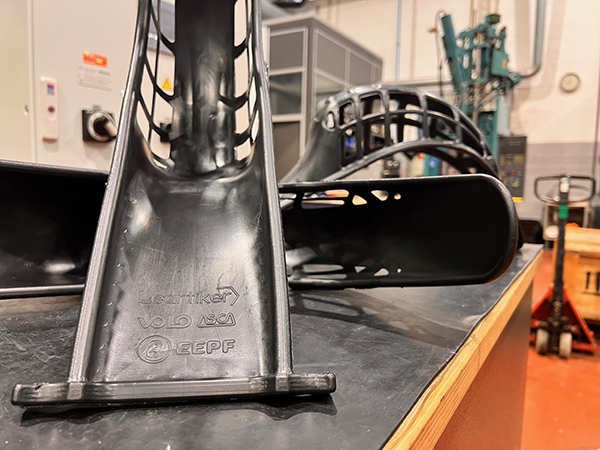A new racket made of recycled plastic for beginners in Jai Alai
Jai Alai (a variation of Basque pelota that uses a scooped racket) has good cause to celebrate thanks to the launch onto the market of a new plastic racket on 30 November. Thanks to a collaborative project between the Basque Pelota Federation, the VOLO association and the Leartiker Technology Centre, and with the support of the Basque Government, a plastic racket has been developed for beginners in Jai Alai.

The start of this initiative dates back to 2019, when several needs were identified that were hampering the promotion of jai alai: the cost of wicker rackets for beginners and how this hindered jai alai being played outside schools, the obstacles to the natural expansion of the sport, the difficulty of introducing changes, and the decline in the number of racket makers, among other things.
Several stakeholders, companies and associations have been involved in various projects that have been forerunners of this project since then: the Xistera association, the company Asca, Leartiker Technology Centre, Lea Artibai Ikastetxea, Teknika, the Basque government's Sports Department, the VOLO association and the Basque Pelota Federation. Thanks to the hard work and determination of all of them, it has been possible to develop the beginner's racket that jai alai needed.
An affordable and practical racket
The main aim of this project was to develop a lightweight, affordable and practical racket, suitable for children and family budgets, and easily extended to jai alai clubs. A tool that could be used in fronton courts of all sizes, as well as in PE classes in schools.
The VOLO association and the Leartiker Technology Centre worked together to develop this new plastic racket which, with a weight of 350 grams and a length of 55 centimetres, is ideal for children aged between 6 and 12 to play jai alai with tennis balls and "goxoa" hand balls.
The material used to manufacture the rackets is a recycled copolymer made from plastic bottle caps, and the racket features a ribbed side structure to make it more manoeuvrable and lightweight. This has led to the development of a lightweight and durable plastic racket.

The new tool has already been tested and has been used in jai alai schools, where initial trials have been promising. This new racket is 100 grams lighter than a traditional wicker racket, which makes the learning process easier and simpler for younger children, who previously found it a little more difficult to handle the traditional wicker racket with ease.
The price of this new beginners' racket ranges from €36.30 (club price) to €60 (general sale price) and it can be purchased on the following website: https://euskalpilotaonline.com/
Far from ending here, this project will continue to develop new products in the future and provide solutions for the various problems faced by this amazing variation of Basque pelota. For this purpose, the profits generated by this project will be reinvested, helping to promote this sport through innovation.
More than just an innovation project
This project is about more than innovation, it is a testament to our commitment to the local community and culture. It is one of those projects in which we build meaningful relationships and cultivate an ecosystem of cooperative values.
Imagine a team that is united not just by its technical prowess, but also by a shared purpose. That is how this initiative came about. Of course, innovation is the bedrock of this project, but its essence lies in the emotional connection between culture, sport and people that weaves a supportive and collaborative network to ensure that a sport like jai alai, which is so deeply rooted in our land, has a better future.


